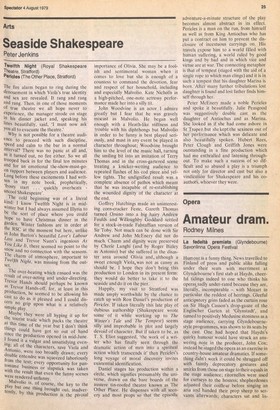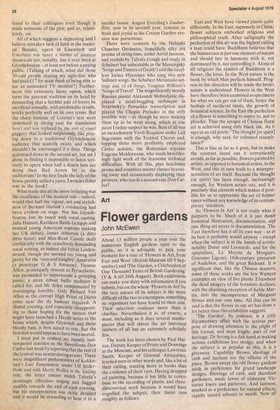Amateur dram.
Rodney Milnes
La fedelta premlata (Glyndeboume) Savonlinna Opera Festival Humour is a funny thing. News travelled to Finland of press and public alike falling under their seats with merriment at Glyndebourne's first stab at Haydn, cheerful tidings indeed to one who thinks his operas,sadly under-rated because they are, literally, incomparable — with Mozart in particular the reddest of herrings. Gleeful anticipatory grins faded as the curtain rose on Sir Hugh Casson's drop-gauze of the Englischer Garten at `Glynstadt', and turned to positively Medusine stoniness as a stage audience, carrying Glyndebournestyle programmes, was shown to its seats by the cast. One had hoped that Haydn's quirky humour would have struck an answering note in the producer, John Cox; instead he staged the opera as an exercise in country-house amateur dramatics. If something didn't work it could be shrugged off with faintly deprecatory gestures and smirks from those on stage to their equals in the stage audience; ritornellos were used for curtseys to the hostess; shepherdesses adjusted their coiffeur before singing an aria and handed their prop sheep to servants afterwards; characters sat and us tened to their colleagues even though it made nonsense of the plot; and so, relentlessly, on.
All of which suggests a depressing and I believe mistaken lack of faith in the material. Besides, opera at Eisenstadt and Esterhaza was never a matter of amateur theatricals nor, notably, has it ever been at Glyndebourne — at least not before a paying public. (Talking of which, what did those 30-odd people sharing my sight-line who had paid £17 for seats think of being able to see an unmasked TV monitor?) Furthermore this extremely funny opera, which turns the pastoral tradition on its head by demanding that a faithful pair of lovers be sacrificed annually, with predictable results, works perfectly well on its own terms. But the sharp humour of Lorenzi's text went unnoticed (a strong case for translation here I and was replaced by the sort of visual gaggery that looked suspiciously like playing down to a traditional Glyndebourne audience that scarcely exists, and which shouldn't be encouraged if it does. Things quietened down in the second act, but am I alone in finding it impossible to listen seriously to opera when half a dozen bats are doing their Red Arrow bit in the auditorium? In the first finale the lady of the house prettily stifled a yawn. I wonder if that was in the book?
What made this all the more irritating was the excellence of the musical side — indeed, would that half the vigour, wit and stylishness of Bernard Haitink's conducting had been evident on stage. Nor has Glyndebourne lost its touch with vocal casting. Julia Hamari, Kathleen Battle (a nippy and musical young American soprano making her UK debut), James Atherton (a ditto ditto tenor) and Max-Rene Cosotti dealt confidently with the ceaselessly demanding vocal writing, as indeed did Sylvia Lindenstrand, though she seemed too young and pretty for the 'vain and haughty' Amaranta (a prototype G & S Amazon). Thomas Allen, grotesquely miscast as Perucchetto, was persuaded to impersonate a primping pansy; a more robust buffo tradition is called for, and Mr Allen compensated by oversinging horribly. Only Richard Van Allan as the corrupt High Priest of Diana came near the sly humour required. A dismal evening, and especially disappointing to those hoping for the success that might have launched a Haydn series in the house which, despite Glynstadt and those bloody bats, is hest suited to one. But the first stab would appear to have been mortal. I must put in context my squally badtempered reaction to the Savonlinna Don Carlos last week by reporting that the rest of the festival was as stimulating as ever. There were magnificent performances of Kokkonen's Last Temptations under Ulf Soderblom and with Martti Wallen in the leading role; the latter cannot match Talvela's seemingly effortless singing and flagged audibly towards the end of each evening, but his interpretation was richly detailed and it would be rewarding to hear it in a smaller house. August Everding's ZauberflOte, now in its seventh year, remains as fresh and joyful as his Covent Garden version was portentous.
There were concerts by the Helsinki Chamber Orchestra, beautifully silky yet precise of string tone, under Arvid Jansons, and recitals by Talvela (rough and ready in Schubert but unbeatable in the Mussorgsky 'Songs and Dances of Death') and the excellent Jorma Hynninen who sang two new Sallinen songs, the Schubert Metastasio settings and, of all things, Vaughan Williams's 'Songs of Travel'. The magnificently moody Russian pianist Aleksandr Slobodjanic displayed a mind-boggling technique in Stravinsky's Petrushka transcription and played the Chopin Preludes in the only possible way — as though he were making them up as he went along, which at one point I rather suspect he was. Best of all was an incandescent Verdi Requiem under Leif Segerstam with the Festival Chorus and, topping three more profitably employed Carlos soloists, the Romanian soprano Eugenia Moldoveanu, who made bewilderingly light work of the fearsome technical difficulties. With all this, plus lunchtime proms and countless master classes beavering away and occasionally displaying their prowess, who needs a second-rate Don Carlos?



































 Previous page
Previous page